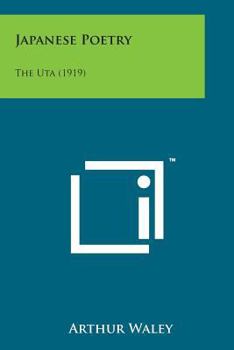Japanese Poetry: The Uta (1919)
Select Format
Select Condition 
Book Overview
This work has been selected by scholars as being culturally important, and is part of the knowledge base of civilization as we know it. This work was reproduced from the original artifact, and remains... This description may be from another edition of this product.
Format:Paperback
Language:English
ISBN:1498180876
ISBN13:9781498180870
Release Date:August 2014
Publisher:Literary Licensing, LLC
Length:112 Pages
Weight:0.35 lbs.
Dimensions:0.2" x 6.0" x 9.0"
Customer Reviews
1 rating
Ian Myles Slater on: A Note to the Curious
Published by Thriftbooks.com User , 19 years ago
I have long used a 1965 reprinting (Percy Lund, Humphries & Co., London) of this little volume -- 110 pages, including a glossary of the romanized texts which accompany the translations of mostly early Japanese poems (about two to a page, for eighty-odd pages). They are overwhelmingly -- to accept the assigned dates -- from the Nara and Heian periods, before the Japan of the samurai and Shoguns, but with a few examples from as late as the seventeenth century. (I don't recall any which are clearly dated more recently, but I may have missed one or two.) I've enjoyed them for years, although mostly by reading them in small quantities. Originally published in 1919, and reprinted without change at long intervals, "Japanese Poetry: The 'Uta'" is one of the earliest examples of Arthur Waley's translations from the literatures of China and Japan (and, on a much smaller scale, from other languages). His translation of selected *No* plays would appear in 1921, and his version of the staggering novel, "The Tale of Genji," in six volumes, would begin publication in the mid-1920s; sudden demonstrations to the English-reading world that Japan had an astonishing literature. He does not seem to have published later translations of Japanese poetry, although he prepared some for a BBC broadcast in the early 1950s, which were printed posthumously. (See the memorial volume edited by Ivan Morris, "Madly Singing in the Mountains.") I mention how early the work is in Waley's career in part to make potential readers aware that the scholarship is essentially early twentieth century, and so to be treated with respect, but not complete confidence. (Even the text editions Waley worked from are mostly historical documents in themselves.) Also, however, to emphasize Waley's boldness. He had already annoyed established Sinologists by translating Chinese poems into daringly "modern" English forms, instead of Victorian rhyming stanzas. (As Waley pointed out, the Chinese poems did rhyme, but in tones, which could hardly be imitated anyway.) Now, a complete amateur in this field as well as in Chinese studies, he was insisting on treating a genre of early Japanese poems (the five-line "uta" of the title) as little works of art, not linguistic and cultural data. Not the "done thing" -- even for some Japanese scholars, who preferred to scold their ancestors for poems showing excessive reverence for Chinese learning, and awarded extra points if they could read a text as "pure" Japanese. (To judge from accounts by Robert Graves and others, many late- and post-Victorian English academics and other scholars seem to have been vulgar Kantians; saying they were studying something only out of Duty, and never admitting to enjoying it, especially not if it was something as trivial as Literature.) Waley took the added step -- still not standard, I am sorry to say -- of providing each translation with a parallel romanized (transliterated) Japanese text, in order to call attention to th




